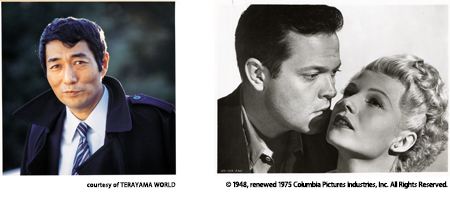
The 28th Tokyo International Film Festival (TIFF) is pleased to announce that we are having two special screenings of works by Shuji Terayama—who used his multiple talents as a poet and as a director of stage and screen to lead the underground cultural scene of the 1960s—and works by Orson Welles—whose influence on modern cinematography through such masterpieces as “Citizen Kane” is incalculable.
TERAYAMA FILMS
In commemoration of 80 years since Terayama’s birth, the festival is screening a special selection of the feature films that Terayama directed. This special selection includes, among other full-length works directed by Terayama, “Pastoral Hide and Seek (DEN’EN NI SHISU)” (1974), which was selected in the competition section of the 28th Cannes International Film Festival and “Labyrinth in the Field” (1979), which was based on the novel written by Kyoka Izumi.
[Shuji TERAYAMA]
Born in 1935 in Aomori Prefecture. Terayama wrote haiku since his youth and was active as a tanka poet during his days as a student at Waseda University. After leaving university without completing his studies, Terayama worked as a playwright, radio dramatist, and screenwriter. In 1967, at age 31, he established the troupe Tenjo Sajiki. Terayama wrote and directed his first full-length film, “Throw away Your Books, Let’s Get into the Streets” (which won the grand prize at the San Remo Film Festival), in 1971. “Pastoral Hide and Seek”, which Terayama directed in 1974, was screened at the 1975 Cannes International Film Festival. Though suffering from illness at the time, Terayama directed “Farewell to the Ark” in 1982. The following year, in 1983, he died from his illness at the young age of 47. The dramas, films, and words that Terayama left to this world continue to provoke audiences around the world, across generations.
Orson Welles: The Known and the Unknown
Orson Welles Retrospective will be co-hosted by the National Film Center, Motion Picture Association, Japan and International Motion Picture Copyright Association. This retrospective celebrates a full century since the birth of Orson Welles (1915–1985), who created many legendary works in the history of global cinema following his sensational debut into the world of film with “Citizen Kane” (1941). Welles’s energetic and creative directorial style gave rise to an expansive filmography that includes numerous unfinished works and multiple versions of his films. At the centenary of Welles’s birth, this special selection of the director’s work—presented with the cooperation of the Munich Film Museum—includes “Citizen Kane” and comes closer to understanding `the unknown Orson Welles.’
[Orson WELLES]
Orson Welles was born in 1915. In 1938, the theater group over which Orson Welles presided performed a radio play based on The War of the Worlds by H.G. Welles (no relation), which caused a nationwide sensation in the USA. Orson Welles’s debut as a film director, “Citizen Kane”, received critical acclaim. However, from Welles’s second film, “The Magnificent Ambersons”, onward, he became one of `cursed filmmakers,’ doomed to see one film after another released in a form differing from his original vision or canceled during production. Regardless, the works that Welles has left audiences for all time are each stamped indelibly with his fierce individuality and never cease to provoke those who watch them. Welles also had an active worldwide career as an actor. He died in 1985.
2015.7.24
-The titles have been changed as follows;
“Throw away Your Books, Rally in the Streets” → “Throw away Your Books, Let’s Get into the Streets”
“Pastoral: To Die in the Country” → “Pastoral Hide and Seek”
“Grass Labyrinth” → “Labyrinth in the Field”
-Orson Welles’s special program: “Orson Welles: The Known and the Unknown”






















